PRODUCT LIST
The Pros and Cons of Lithium-Ion Batteries for Data Centers

Since there are no economically viable alternatives to VRLA batteries, design engineers have had to put up with their shortcomings. But, the situation has changed in recent years for lithium-ion batteries. Up until now, it was not viable to use them in the uninterruptible power supply systems of data centers since there was no reasonable balance between price, energy, capacity, safety, and reliability. Thanks to advancements in electric vehicles, this problem has been solved. The first uninterruptible power supply systems powered by lithium-ion batteries hit the market in 2016. Now, they are offered by all of the leading players, and today this direction is considered the most promising. According to Bloomberg New Energy Finance report, by 2025, lithium-ion solutions will account for 40% of the market for UPSs used in data center.
The Pros of Lithium-Ion Batteries
Consumer electronics companies typically use lithium-ion cobalt batteries which feature capacities of several Ampere hours. These uninterruptible power supply systems come with rectangular lithium manganese cells. Their installed capacity is 60 Ampere hours, and they feature much longer service life and multiple degrees of failure protection. Individual modules and, sometimes, even individual cells are responsible for monitoring key performance parameters such as temperature, voltage, and current. Sometimes, power cabinets and even the entire system can be responsible for such a monitoring process. Monitoring is necessary to get full control over charging and discharging processes to prevent critical heating and irreversible chemical processes from occurring. Lithium-ion batteries also have a higher energy density (Wh/kg) and higher output power density (W/kg). With similar energy storage capacity, they weigh about three times less than lead acid batteries, which helps reduce the total mass of the system by about 60-80%.
In recent years, data centers have aimed to increase their power density given their limitations on space and the need for more-efficient operations. More efficient use of available space is one of the most relevant tasks of data center owners. Compact lithium-ion batteries reduce the area occupied by a uninterrupted power supply system by 50-80%. Such batteries require less time for charging and feature a better self-discharge rate, which plays a major role in the event of frequent outages. When sitting idle, a lithium-ion battery loses about 1-2% of its charge per month. The most important advantage is its long service life. Lead acid batteries have a pretty short life cycle, from 3 to 6 years. Lithium-ion batteries, on the other hand, should last for about 10 years. Depending on chemistry, technology, and temperature, they can feature charging efficiency of up to 5,000 life cycles and are maintenance-free, while the average charging efficiency for lead acid batteries is only 700 life cycles.
Total cost of ownership for a period of 10 years (average lifespan of UPS for data centers) decreased by 39% compared to lead acid batteries. Although it is an optimistic estimate, at least 10% of savings are guaranteed. There is only one serious flaw with lithium-ion batteries—the initial investment is significantly higher. That is why large data centers have been pioneers when it comes to the introduction of new solutions. It is much more important for such facilities to reduce TCO than to get any short-term benefits, and even a small percentage of monetary savings is enormous in this case. In addition, compact batteries allow for more efficient use of the available space, while reliable monitoring systems ensure better safety and stable performance. Lithium-ion batteries can operate at higher temperatures than VRLA without losing capacity, which reduces the load on cooling systems. Of course, there are even one-phase UPSs equipped with lithium-ion batteries. There are models for a variety of applications, starting with the largest data centers, industrial applications and ending with small server rooms and even individual racks.
Expediency of Replacement
The most important question that every end customer asks themselves eventually is: Is now the right time to upgrade our uninterrupted power supply system to lithium-ion batteries? To answer this question, the first thing to consider is the availability of technical capacity. New batteries are not available for all UPS models and significant hardware and embedded software upgrades may be required. Even at the same nominal voltage, the characteristics of battery charging and discharging will differ.
The life expectancy of a typical UPS system in a data center is usually 10-15 years. Lead acid batteries work for 3-6 years whereas lithium-ion batteries last 10 years or even longer. At the beginning of the service life of a UPS system (less than 5 years old), replacing a significant portion of lead acid batteries will prove useful. However, when it comes to lithium-ion batteries they are most likely to last right up to the day when the UPS system gives out. If service life of your uninterrupted power supply system is nearing its middle point, battery service life may be longer, and in most cases it makes no sense to replace them. At the end of its service life, consideration should be given to replacing your entire UPS system with a new lithium-ion battery solution. However, even for an old UPS system, installing expensive batteries may be expedient. You should take into account the constant decline in their price, as well as the ratio of maintenance costs of the old system and the cost of its full replacement.
Forecasts and Prospects
Although UPS systems powered by lithium-ion batteries substantially reduce operating costs and the total cost of ownership, a large proportion of customers still use VRLA-time-tested solutions. This can be explained first of all by the fact that using lithium-ion batteries is only advantageous for a long-term perspective. However, it does significantly increase capital costs. In any case, customer interest in innovation is growing year after year and will only continue growing. For large data centers, the volume of savings can be enormous, so lithium-ion-powered systems will be increasingly used in the corporate sector. Lithium-ion chemistry keeps advancing too. New solutions and technologies will emerge over time, and the price of lithium-ion batteries will drop even further.
▼ An example of battery configurations in a data center : VRLA vs. Li-ion Batteries





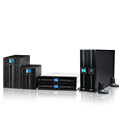
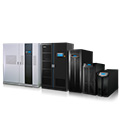
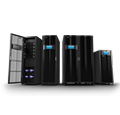
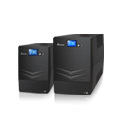
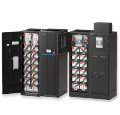
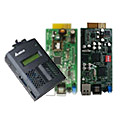

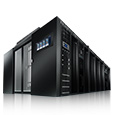


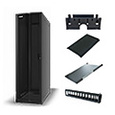
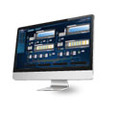
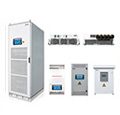
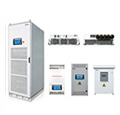


















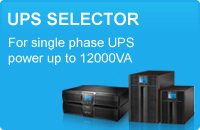
.gif)
